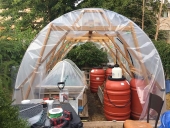Welcome to permies Lizzie

Has your compost stayed hot through the winter in the past?
Speaking of winter, the compost isn't too sodden is it?
It seems to me that worms would be the
result of #2, 3 and possibly other conditions, since they don't like it too hot.
I can't imagine them being the
cause of a compost heap not heating.
I generally build heaps over time so they don't get properly 'hot' and there's always a lot of worms.
I usually only turn it once or twice: when the bin gets overly full, I collect a load of high nitrogen material
and turn the pile into an empty bin, adding nitrogenous material as I go.
I always find some pretty whiffy anaerobic spots toward the bottom...
It always heats up quite a bit after that, and the worms probably move out for a while!










 1
1





 1
1




 3
3






